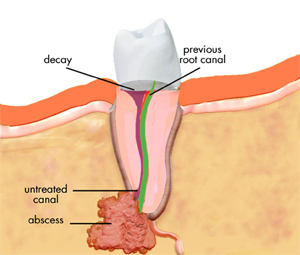Root Canal
Root canal (endodontic therapy) is a technique that saves your natural teeth. At the centre of your tooth is the pulp. Infection in the pulp calls for root canal treatment. Infection causes inflammation of the pulp, usually associated with pain and discomfort. It is essential to remove the dental pulp to arrest the infection and damage, preserving the tooth for a longer time. The root canal system is thoroughly cleaned and sealed.
This therapy usually involves local anesthesia and may be completed in one or more visits depending on the treatment required. Success for this type of treatment occurs in about 90% of cases. You will be able to drive home after your treatment, and you probably will be comfortable returning to your normal routine.
Important: All patients under the age of 18 years of age must be accompanied by a parent or guardian at the consultation visit.
Please alert the clinic if you have a medical condition that may be of concern prior to treatment (i.e. diabetes, high blood pressure, artificial heart valves and joints, rheumatic fever, etc.) or if you are on any medication (i.e. heart medications, aspirin, anticoagulant therapy, etc.)
Traumatic Injuries
Dislodged Teeth: Injuries to the mouth can cause teeth to be pushed back into their sockets. The dentist may reposition and stabilize your tooth. Root canal treatment is started within a few weeks of the injury and a medication, such as calcium hydroxide, will be placed inside the tooth. Eventually, a permanent root canal filling will be implanted.
Avulsed Teeth: If an injury causes a tooth to be completely knocked out of your mouth, it is important that you are treated immediately. If this happens, keep the tooth moist. If possible, put it back into the socket. A tooth can be saved if it remains moist. You can even put the tooth in milk or a glass of water (add a pinch of salt.) Dentist may start root canal treatment based upon the stage of root development.
We answer your questions
Will I Feel Discomfort During or After the Procedure?
With modern anesthetic techniques, the majority of patients are comfortable during the procedure. For the first few days after treatment, your tooth may be sensitive or sore, especially if there was discomfort or infection before the procedure. Over-the-counter analgesics are prescribed by dentist for discomfort.
Should I Be Worried About x-rays?
We use digital radiography, an advanced computerized system that produces radiation levels 90 percent lower than conventional dental x-rays.
Why Would I Need Endodontic Microsurgery?
Endodontic surgery can be used to locate fractures or hidden canals that do not appear on x-rays but still manifest discomfort in the tooth. Damaged root surfaces or the surrounding bone may also be treated with this procedure. The most common surgery used to save damaged teeth is an apicoectomy or root-end resection.
What is an Apicoectomy?
An incision is made in the gum tissue to expose the bone and surrounding inflamed tissue. The damaged tissue is removed along with the end of the root tip. A root-end filling is placed to prevent reinfection of the root and the gum is sutured. Microsurgical techniques allow us to make a minimal incision and access to the root apex.
Endodontic Re-treatment
A tooth that has received treatment may fail to heal or pain may exist. Sometimes, the pain may occur months or years after treatment. If so, Endodontic Re-treatment may be needed.
Improper Healing May be Caused by:
Curved or narrow canals were not treated during the initial treatment.
Complicated canals went undetected during the initial treatment.
The crown or restoration was not placed within the appropriate amount of time following the procedure.
The crown or restoration did not prevent saliva from contaminating the inside of the tooth.
